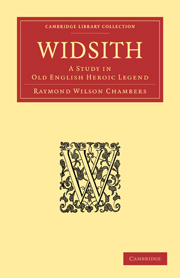Book contents
- Frontmatter
- PREFACE
- Contents
- CORRECTIONS AND ADDITIONAL NOTES
- CHAP. I WIDSITH AND THE GERMAN HEROIC AGE
- CHAP. II THE STORIES KNOWN TO WIDSITH: GOTHIC AND BURGUNDIAN HEROES
- CHAP. III THE STORIES KNOWN TO WIDSITH: TALES OF THE SEA-FOLK, OF THE FRANKS AND OF THE LOMBARDS
- CHAP. IV WIDSITH AND THE CRITICS
- CHAP. V THE GEOGRAPHY OF WIDSITH
- CHAP. VI THE LANGUAGE AND METRE OF WIDSITH
- CHAP. VII SUMMARY AND CONCLUSION
- TEXT OF WIDSITH, WITH NOTES
- APPENDIX
- MAPS AND INDEX
CHAP. IV - WIDSITH AND THE CRITICS
Published online by Cambridge University Press: 16 May 2011
- Frontmatter
- PREFACE
- Contents
- CORRECTIONS AND ADDITIONAL NOTES
- CHAP. I WIDSITH AND THE GERMAN HEROIC AGE
- CHAP. II THE STORIES KNOWN TO WIDSITH: GOTHIC AND BURGUNDIAN HEROES
- CHAP. III THE STORIES KNOWN TO WIDSITH: TALES OF THE SEA-FOLK, OF THE FRANKS AND OF THE LOMBARDS
- CHAP. IV WIDSITH AND THE CRITICS
- CHAP. V THE GEOGRAPHY OF WIDSITH
- CHAP. VI THE LANGUAGE AND METRE OF WIDSITH
- CHAP. VII SUMMARY AND CONCLUSION
- TEXT OF WIDSITH, WITH NOTES
- APPENDIX
- MAPS AND INDEX
Summary
The views which scholars have held about Widsith have mainly been based upon a literary study of its style and heroic legend. Before going on to examine the geography, grammar and metre of the poem, we may see what measure of agreement has been arrived at upon grounds of style and legend. We can then decide whether or not these conclusions are confirmed by a study of metrical and grammatical details.
Natural divisions of the poem
There is, at any rate, a prima facie case for the theory that Widsith is compounded from several sources. If, as is likely enough, several metrical catalogues existed in early times, enumerating kings and tribes, they would be likely to coalesce. And it cannot be denied that the poem, as we have it, falls into certain well-defined sections:
(a) First, we have an introduction of nine lines, characterizing Widsith, and introducing the poem proper : “Widsith the far-travelled Myrging, who, with Ealhhild, sought the home of Ermanaric, spake and said”—
(A) Then follows a catalogue of kings and tribes, two kings and two tribes being generally mentioned in each line:
Ætla weold Hunum, Eormanric Gotum.
The Traveller's personality is here kept quite in the background. The list, it is true, begins “I have heard of many kings ruling over the nations”: but ic gefrœgn is an epic formula with little meaning. Widsith is not said to have himself visited either the kings or their folk. After seventeen lines in which the names of kings and princes are crowded together, we get, in more detail, allusions to the stories of Offa of Angel, of Hrothwulf, Hrothgar and Ingeld.
- Type
- Chapter
- Information
- WidsithA Study in Old English Heroic Legend, pp. 127 - 152Publisher: Cambridge University PressPrint publication year: 2010First published in: 1912



